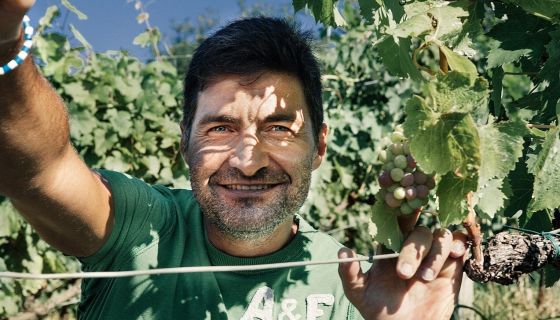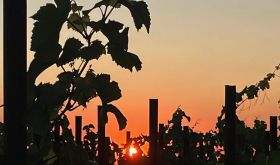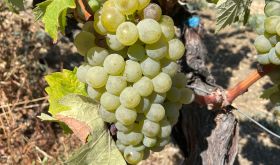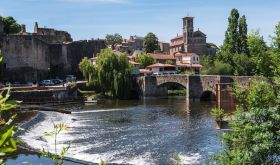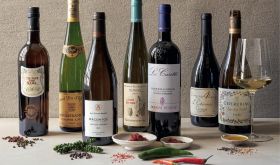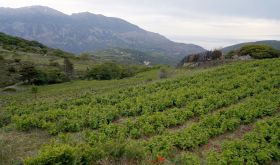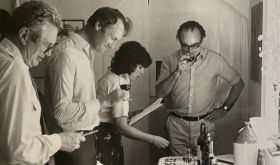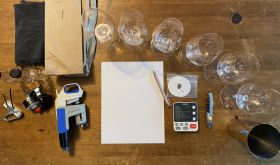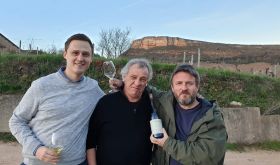"Nicolucci, if we go home alive I will sell you my vineyard in Predappio." These were the words of an army corps general during the First World War in the Karst addressed to Amedeo Nicolucci and it is at that moment that the myth of the Vigna del Generale was born. This small vineyard of 2.5 hectares with vines that are today over 90 years old at that time was the most beautiful vineyard that was in the small valley of Predappio alta, in Emilia-Romagna and it was called like this because the owner was a General of the army.
I had visited the Fattoria Nicolucci for the first time two years ago, in 2019, and it was a pleasure to meet again Alessandro Nicolucci, Amedeo's grandson and current owner of the winery. Although his face reveals awareness for the particular situation that the whole world has had to face, his smile is always engaging, his eyes are lively and his words convey passion, determination and hope for the future. We sit in the tasting room to have a chat, a small tavern full of memorabilia and photographs that fully represent the 136 years of history of the Nicolucci family. A place full of memories, joys, confrontations, of "punches on the table" as Alessandro says when he tells me about the clashes that he had with his father Giuseppe, "Pino" for friends (who died in 2012), because they both had different ideas about how the wine was to be made.
The Nicolucci family since 1885 was known in the territory of Predappio Alta because they were good winemakers (sharecroppers) even if they were not owners of land. After the General gave the vineyard to Amedeo, the Vigna del Generale began to make itself known. “We have always focused above all on the Vigna del Generale considering it our standard bearer”, Alessandro tells me. His grandfather fermented it in open wooden vats trying to sell it a year after the harvest but he realized that it was too rough and austere, it needed to mature. The turning point came with Alessandro's father, Giuseppe, who managed to give the winery an entrepreneurial imprint. Having studied, he realized that by letting the wine mature for one or two years in oak barrels, the wine softened and changed, becoming more drinkable. Later he started printing labels more regularly and decided to create the Vigna del Generale brand. The first bottle labeled Vigna del Generale dates back to 1979, but in the historic underground cellars of the winery (the cellars of the Predappio Alta castle dating back to the end of 1200, which among other things had become a refuge during the Second World War) are preserved bottles dating back to 1885.
Until the 1960s, the mines where sulfur was extracted were active in Predappio Alta. Above these abandoned mines, Nicolucci has its vineyards, 10 hectares of which 2.5 are occupied by the historic Vigna del Generale. The hill where the vineyard is located, which today is over 90 years old, is a real anomaly from a geological point of view because it is an outcrop of volcanic and stony soil, with veins of sulfur and gypsum. The Sangiovese grape tends to be smaller than in other areas of Romagna with sparse bunches and thanks to its powerful structure, the wine naturally lends itself to very long refinements. The Vigna del Generale has been maintained for so long because the genetic material and self-regulation of such an old vine is capable of producing highly qualitative wines. The root system is so large and set in this microclimate that it is difficult for a young vineyard to keep up with it in terms of quality. The secret of its longevity, Alessandro explains to me, is its constant care over time. "If you take care of a vineyard by rocking it with love and dedication, it repays you by giving you love and satisfaction over the years and consequently, her life gets longer". More than 70% of the work is done in the vineyard, all strictly by hand, without the aid of machines that would not be able to operate in such an uncomfortable area. According to Alessandro Nicolucci, "Quality is made in the vineyard and in the cellar you just have to be careful not to ruin what you have done before".
The Nicolucci family has always had a classic approach with austere and hard wines from the gustatory point of view, for this reason, when there was the boom of barrique-aged wines, both Alessandro and his father did not agree on the use of this material to mature their wines. Having traveled a lot, his father Giuseppe realized that the Vigna del Generale could hold its own against other famous wines in Italy and around the world, spurring the family to improve more and more. During our chat, I asked Alessandro how he managed to carry on the family business, which has reached its fourth generation with him. “In my case, the generational change was almost natural. As a child I used to play in the underground cellars and I breathed the air of this environment, learning to appreciate it over time ". There was no lack of clashes with his father Giuseppe on the production vision and on the way to work in the cellar. He tried to convince his father that the Vigna del Generale had to be softer and more drinkable because not all consumers appreciated it. This could only be done by making the grapes ripen better in the vineyard and with shorter fermentations in the cellar. “My first vintage alone was the 2000 after a great discussion with my father,” says Alessandro. The father did not listen to his precious advice and one year they decided to hire an external winemaker to have a more objective vision. After realizing that the winemaker said the same things as Alessandro, Giuseppe accused the winemaker of having made an agreement with his son. At the end, the latter was able to find an agreement with his father. Together with the winemaker, Alessandro would manage two rows of the Vigna del Generale, creating a tank of wine that he would compare with that of his father. In January 1999 they found themselves at the same table where I am now chatting with Alessandro, they compared the two bottles and the result was that Alessandro's wine was much more drinkable and pleasant than his father's. "I remember as if it were yesterday", he tells me, “At the end of the tasting, my father said “From next year you will make the wine.”going from 100% of responsibility to 0%. Since that day He has not touched anything in the cellar. " With Alessandro's father there were no compromises, the world was black or white. However Giuseppe Nicolucci was a man of broad-minded and visionary, in love with nature and the vineyard, he deeply believed in the Vigna del Generale and in the Predappio area. He had realized that there had to be a change of pace because the way of living, eating and understanding wine was changing, gradually placing full trust in his son.
For the 130th anniversary of the Fattoria Nicolucci, Alessandro decided to make a selection of the Vigna del Generale, a special bottle to commemorate this very special event. "Inside the Vigna del Generale, we placed a ribbon in the most beautiful vines and only the most beautiful grapes were harvested with the help of 20 grape harvesters for 2 days, an immense and complicated job", he tells me. The must was fermented in open barrels for a month. The barrel was then sealed and the product remained inside for another month and a half. The wine was finally transferred to large barrels for 40 months. "The selection is made only in the best vintages, I did it for the first time in 2015, then in 2016 and 2020.", Alessandro explains to me. The wine is released on the market in the fifth year after the harvest and has found big success both nationally and internationally. Alessandro also wanted to attach a note to the bottle containing the municipal statutes of Predappio dating back to 1383 which already regulated the use of the vineyard, translated from Latin into Italian. The bottle is much more slender than the classic Burgundy-type bottle from Vigna del Generale (which traditionally matures for 24 months in oak barrels), with a very heavy and expensive glass. The label, characterized by a red wolf howling at the moon, has a very special history. The general who sold the vineyard to Alessandro's grandfather, Amedeo, had raised a wolf pup that he always carried with him just like a guard dog. When the grapes in the vineyard were ripe enough, the general's wolf went into the vineyard and ate the ripe grapes, soiling his own coat of grapes. The wolf on the label represents a recognition by the Nicolucci family not only to the General who gave them this vineyard, but also to its centuries-old history.
Romagna is a “Cinderella in the wine world” as Nicolucci defines it, still too little considered at national and international level. Very little has always been invested in the quality and marketing of the wines of this area. Luigi Veronelli, a famous Italian journalist and gastronome who wrote about wines, one day came to visit the winery when Alessandro was still a boy and said to his father Giuseppe these words: "Nicolucci, if your winery were located in Tuscany, the Vigna del Generale would be a of the spearheads of our country". To date it can be said that thanks to the passion, the dedication and the determination of Alessandro, the Vigna del Generale has achieved numerous national and international awards. Over time, thanks to the wisdom of the Nicolucci family who guard it, the Vigna del Generale has become not only a point of reference for the producers of the Romagna area but an excellence that represents the history and culture of this region.
The photos were provided by Mirko Pastorelli.

